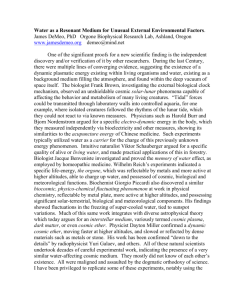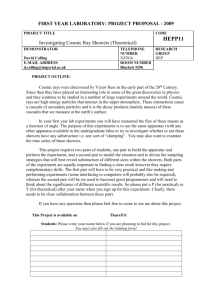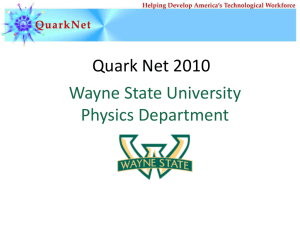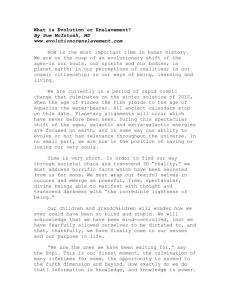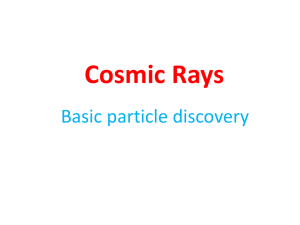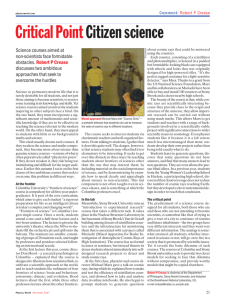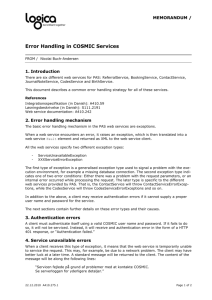A History of Cosmic Rays - Crop at UNL
advertisement
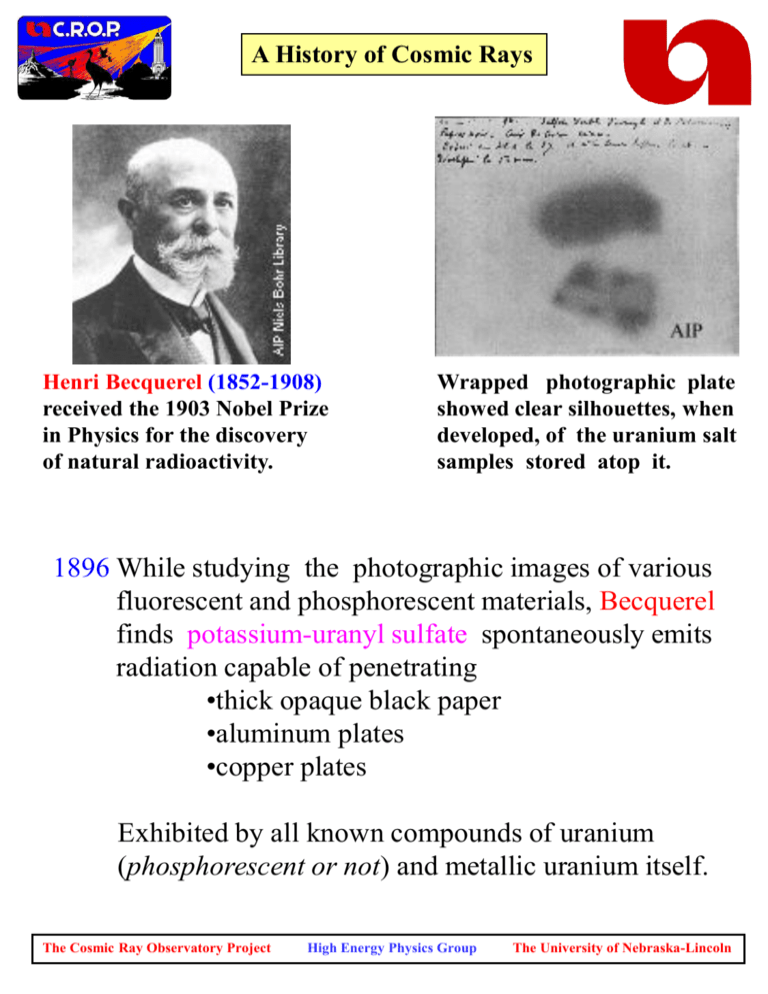
A History of Cosmic Rays Henri Becquerel (1852-1908) received the 1903 Nobel Prize in Physics for the discovery of natural radioactivity. Wrapped photographic plate showed clear silhouettes, when developed, of the uranium salt samples stored atop it. 1896 While studying the photographic images of various fluorescent and phosphorescent materials, Becquerel finds potassium-uranyl sulfate spontaneously emits radiation capable of penetrating •thick opaque black paper •aluminum plates •copper plates Exhibited by all known compounds of uranium (phosphorescent or not) and metallic uranium itself. The Cosmic Ray Observatory Project High Energy Physics Group The University of Nebraska-Lincoln A History of Cosmic Rays 1898 Marie Curie discovers thorium (90Th) Together Pierre and Marie Curie discover polonium (84Po) and radium (88Ra) 1899 Ernest Rutherford identifies 2 distinct kinds of rays emitted by uranium: - highly ionizing, but completely absorbed by 0.006 cm aluminum foil or a few cm of air - less ionizing, but penetrate many meters of air or up to a cm of aluminum. 1900 P. Villard finds in addition to rays, radium emits - the least ionizing, but capable of penetrating many cm of lead, several feet of concrete The Cosmic Ray Observatory Project High Energy Physics Group The University of Nebraska-Lincoln A History of Cosmic Rays Magnitude of Magnetic Force Lorentz Law Magnetic force is related to q, v and B Experimental observations: • force depends on the direction of v relative to B • if v is parallel to B F = 0 • if v is perpendicular to B F = Fmax • if v is at angle q from B F = Fmax sinq F = q v B sinq The Cosmic Ray Observatory Project High Energy Physics Group The University of Nebraska-Lincoln A History of Cosmic Rays Direction of Magnetic Force Drawing vectors in tail head out of in to page page Direction of magnetic force is “sideways” •force is perpendicular to both v and B •use “right-hand” or “left-hand rule” to find its direction F = q v B sinq The Cosmic Ray Observatory Project High Energy Physics Group The University of Nebraska-Lincoln A History of Cosmic Rays Right Hand Rule Examples B x x x x x x B x x x x x x v x x x x x x F q v q F=0 B v q F The Cosmic Ray Observatory Project High Energy Physics Group The University of Nebraska-Lincoln A History of Cosmic Rays What is the direction of the force on a positive charge when the velocity and magnetic field B are indicated as below? B v A v v B The Cosmic Ray Observatory Project B C D High Energy Physics Group B E) none of these The University of Nebraska-Lincoln A History of Cosmic Rays What is the direction of the force on a positive charge when the velocity and magnetic field B are indicated as below? B B v v B v A B The Cosmic Ray Observatory Project C D High Energy Physics Group E) none of these The University of Nebraska-Lincoln A History of Cosmic Rays A positively charged beam enters a magnetic field region as shown. What is the direction of B? y z A + y (up) x B – y (down) C + x (right) D + z (out of page) E – z (into page) The Cosmic Ray Observatory Project High Energy Physics Group The University of Nebraska-Lincoln A History of Cosmic Rays An uncharged particle enters a region with the magnetic field shown. What path will it follow? B field x x x x x x x x x x x x A x x x x x x x x x x x x x x x x x x x x x x x x x x x x x x x x x x x x B x x x x x x x x x x x x x x x x x x x x x x x x D The Cosmic Ray Observatory Project High Energy Physics Group C The University of Nebraska-Lincoln A History of Cosmic Rays A charged particle moves in a straight line through some region of space. The net magnetic field in this region must be zero. T)True The Cosmic Ray Observatory Project F) False High Energy Physics Group The University of Nebraska-Lincoln A History of Cosmic Rays B-field points into page From these observations alone, what definite conclusions can be made? A.s are positively charged, s negative. B. s are negatively charged, s positive. C. can only say , oppositely charged. The Cosmic Ray Observatory Project High Energy Physics Group The University of Nebraska-Lincoln A History of Cosmic Rays X B field Y Z Imagine three particles A, B and C all with the same mass, but different charges. (Particle B is neutral). When A enters the magnetic field, it follows path Z. When particle B enters the magnetic field, it will follow path A) X B) Y C) Z When particle C enters the magnetic field, it will follow path A) X B) Y C) Z The Cosmic Ray Observatory Project High Energy Physics Group The University of Nebraska-Lincoln A History of Cosmic Rays X B field Y Z Imagine three particles A, B and C all with the same mass, but different charges. (Particle B is neutral). When A enters the magnetic field, it follows path Z. When particle B enters the magnetic field, it will follow path A) X B) Y C) Z When particle C enters the magnetic field, it will follow path A) X B) Y C) Z The answer to the first question is (2). A magnetic field exerts forces on moving charges. If there is no charge (as for a neutral particle) there is no force. The Lorentz Force Law says that F=qvB when v and B are perpendicular. If q=0, the F=0. The answer to the second question is (3). The charge of C is opposite that of A, which we can write as q(C) = q(A), so F(C) = F(A). A minus sign on a vector means that it points in the opposite direction. So if A follows path X, then C must follow path Z. The Cosmic Ray Observatory Project High Energy Physics Group The University of Nebraska-Lincoln A History of Cosmic Rays B field out of page X Y Z Particles A and B have the same charge, but particle B has more mass. When particle A enters the magnetic field, it travels along line Y. When particle B enters the magnetic field, it will follow line A) X B) Y C) Z The Cosmic Ray Observatory Project High Energy Physics Group The University of Nebraska-Lincoln A History of Cosmic Rays B-field points into page From these observations alone, do the magnitude of their charges compare? A. q<q B. q=q C. q>q D. you cannot determine this The Cosmic Ray Observatory Project High Energy Physics Group The University of Nebraska-Lincoln A History of Cosmic Rays B-field points into page From these observations alone, what definite conclusions can be made? A. s are more massive than s. B. s are more massive than s. C. s are more massive than s. D. Masses cannot be directly compared. The Cosmic Ray Observatory Project High Energy Physics Group The University of Nebraska-Lincoln A History of Cosmic Rays The Cosmic Ray Observatory Project High Energy Physics Group The University of Nebraska-Lincoln A History of Cosmic Rays 1900-01 Studying the deflection of these rays in magnetic fields, Becquerel and the Curies establish rays to be charged particles Using the procedure developed by J.J. Thomson in 1887 Becquerel determined the ratio of charge q to mass m for : q/m = 1.76×1011 coulombs/kilogram identical to the electron! : q/m = 4.8×107 coulombs/kilogram 4000 times smaller! Noting helium gas often found trapped in samples of radioactive minerals, Rutherford speculated that particles might be doubly ionized Helium atoms (He++) 1906-1909 Rutherford and T.D.Royds develop their “alpha mousetrap” to collect alpha particles and show this yields a gas with the spectral emission lines of helium! The Cosmic Ray Observatory Project High Energy Physics Group The University of Nebraska-Lincoln A History of Cosmic Rays s are ionized Helium (bare Helium nuclei) 2-protons, 2-neutrons (positively charged) s are simply electrons(negatively charged) q = 2q m=7296m The Cosmic Ray Observatory Project High Energy Physics Group The University of Nebraska-Lincoln A History of Cosmic Rays 1911-12 Austrian physicist Victor Hess, of the Vienna University, and 2 assistants, carried Wulf ionization chambers up in a series of hydrogen balloon flights. • taking ~hour long readings at several altitudes • both ascending and descending • radiation more intense above 150 meters than at sea level • intensity doubled between 1000 m to 4000 m • increased continuously through 5000 meters Dubbed this “high” level radiation Höhenstrahlung Hess lands following a historic 5,300 meter flight. August 7, 1912 National Geographic photograph In 1936, Hess was awarded the Nobel prize for this discovery. The Cosmic Ray Observatory Project High Energy Physics Group The University of Nebraska-Lincoln A History of Cosmic Rays Cosmic ray strikes a nucleus within a layer of photographic emulsion The Cosmic Ray Observatory Project High Energy Physics Group 50mm The University of Nebraska-Lincoln A History of Cosmic Rays 1913-14 Werner Kolhörster of Berlin’s Physikalisch-Technische Reichsanstalt •ascends to 9300 m (height of Mount Everest, cruising altitude of a passenger jet!) •ionization rate 50× that at sea level! 1925-26 Robert Millikan of Caltech (winner of the 1923 Nobel prize) initially fails to duplicate such results • over San Antonio, Texas, found “not more than 25% of that found by European observers.” Further high-altitude measurements made in collaboration with Ira S. Bowen confirmed the existence of what Millikan coined “cosmic rays”. Ionization chambers grow more robust and reliable. Automated to work and be recorded remotely. The Cosmic Ray Observatory Project High Energy Physics Group The University of Nebraska-Lincoln A History of Cosmic Rays 1911 Rutherford’s assistant Hans Geiger develops a device registering the passage of ionizing particles. 1924 Walter Bothe and Geiger use multiple Geiger counters to establish the tracks followed by electron beams 1928-29 Bothe and Wernre Kolhörser build Geiger telescopes and announce cosmic “rays” contain charged particles The Cosmic Ray Observatory Project High Energy Physics Group The University of Nebraska-Lincoln A History of Cosmic Rays 1927-28 Jacob Clay travels from Genoa to the Dutch colony of Java with an ionization chamber and finds •intensity drops ~6% •minimum at magnetic equator 1929 Bothe & Kolhorster •suggest Clay’s Lattitude Effect could be due to charged primaries deflccted by earth’s magnetic field •inspired by the Norwegian mathematician Carl Størmer’s calculations explaining colleague Kristian Birkland’s theory of the aurora • Birkland had experimented with electron beams and a phosphorous-painted globe of lodestone The Cosmic Ray Observatory Project High Energy Physics Group The University of Nebraska-Lincoln A History of Cosmic Rays Earth’s magnetic field is approximately that of a bar magnet. • Field strength is not the same everywhere stronger at the poles • Field angle is different in different locations vertical at poles, horizontal at magnetic equator • South magnetic pole is at north geographic pole Magnetic axis does not line up with rotation axis • compass correction depends on location New York 10° W Chicago 0° L.A. 18° E Magnetic poles move, and sometimes reverse direction Location of S magnetic pole over last century Cause: Not fully understood, but is somehow due to motion of charged particles in Earth’s molten interior. But why aren’t poles aligned with rotation axis? Other astronomical bodies with magnetic fields: Mercury and Jupiter, The Sun, The Milky Way galaxy The Cosmic Ray Observatory Project High Energy Physics Group The University of Nebraska-Lincoln A History of Cosmic Rays The Cosmic Ray Observatory Project High Energy Physics Group The University of Nebraska-Lincoln A History of Cosmic Rays The North pole of a small magnet (compass) points towards geographic North because Earth’s magnetic South pole is up there!! The field lines of the Earth’s field are not parallel (except at the equator) to the surface of the earth “Dip Angle” 1995• 80o 1975• 1948• 1904• 70o Northwest Territories The magnetic pole is not exactly at geographic north (compass corrections needed). The poles in fact drift, and occasionally reverse polarity! The Cosmic Ray Observatory Project High Energy Physics Group The University of Nebraska-Lincoln A History of Cosmic Rays 1930-33 Arthur Compton (University of Chicago) conducts a worldwide sea-level (and mountain lattitude) survey of cosmic ray intensities and confirms the Latitude Effect. The 4 curves correspond to 4 seasons. Physical Review 52 [1937]:p.808 Størmer’s “cutoff energies”: only the fastest cosmics reach sea level near the equator less energetic particles are observable at mid-latitudes unrestricted energies in the polar regions September 21, 1932 Millikan completed a series of tests on the intensity of cosmic rays at various altitudes in a Condor bomber from March Field, California. The Cosmic Ray Observatory Project High Energy Physics Group The University of Nebraska-Lincoln A History of Cosmic Rays 1933-35 Thomas Johnson (of the Carnegie Institute) and Bruno Rossi (Italy) independently mount Geiger counter telescope arrays to test for the east-west asymmetry predicted by Georges Lemaître (Belgian) The Cosmic Ray Observatory Project High Energy Physics Group The University of Nebraska-Lincoln A History of Cosmic Rays The Cosmic Ray Observatory Project High Energy Physics Group The University of Nebraska-Lincoln A History of Cosmic Rays Positive charged particles headed toward the earth from space, would tend (at mid-latitudes) to reach the surface coming down from the A. North B. South C. East D. West E. split East and West The Cosmic Ray Observatory Project High Energy Physics Group The University of Nebraska-Lincoln A History of Cosmic Rays Although cosmic rays do come “from all directions”, at high altitudes near the equator the intensity is higher coming from the West than from the East! 1939 Johnson speculates primaries may be protons! The Cosmic Ray Observatory Project High Energy Physics Group The University of Nebraska-Lincoln A History of Cosmic Rays November 11, 1935 Explorer II, a 113,000 cubic foot helium balloon ascends to a record 22,066 m while collecting atmospheric and cosmic ray data. 1937-1939 Studies of Extended Air Showers begin in France when by accident Pierre Auger and his Russian colleague Dimitry Skobeltzyn notice apparent coincidence between Cosmic Ray telescopes set up several hundred meters apart. Cloud chamber photographs by George Rochester and J.G. Wilson of Manchester University showed the large number of particles contained within such showers. The Cosmic Ray Observatory Project High Energy Physics Group The University of Nebraska-Lincoln A History of Cosmic Rays 1936 Millikan’s group show that at the earth’s surface showers are dominated by electrons, gammas, and X-particles capable of penetrating deep underground (to lake bottom and deep tunnel experiments) characterized there by isolated single cloud chamber tracks The Cosmic Ray Observatory Project High Energy Physics Group The University of Nebraska-Lincoln A History of Cosmic Rays Definite evidence for the celestial generation of Cosmic Rays came from fortuitous timing of a few high altitude balloon studies during some spectacular solar flares. The Cosmic Ray Observatory Project High Energy Physics Group The University of Nebraska-Lincoln A History of Cosmic Rays Unusual increase in Cosmic ray intensity associated with an intense solar flare observed February 28, 1942 the same sunspot associated with this flare erupts again March 7, 1942 Similarly the June 4, 1946 solar prominence is followed by another eruption July 25, 1946 and the solar flare event of November 19, 1949 is also captured by airborne cosmic ray instruments each accompanied by a Sudden Ionospheric Disturbance which interrupts radio communications on earth The Cosmic Ray Observatory Project High Energy Physics Group The University of Nebraska-Lincoln A History of Cosmic Rays During the June 1946 prominence, ultraviolet radiation and x-rays arrived simultaneous to the visual observation of the flare. Why? Radio interference began immediately. Charged particles causing radio blackouts arrived about 3 hours later. But ground-based monitoring stations at low magnetic latitudes observed no increase. Why? However on November 14, 1960 Explorer VII detects solar flares causing “extremely severe” magnetic disturbances in the Earth's atmosphere. The sea level neutron counter at Deep River, Canada records: J.F.Steljes, H.Carmichael, K.McCracken, Journal of Geophysical Research 66 [1961]:p.1363 and the National Bureau of Standards measures extensive attenuation of radio transmissions The Cosmic Ray Observatory Project High Energy Physics Group The University of Nebraska-Lincoln A History of Cosmic Rays May 11, 1950 A Naval Research Viking research rocket fired from the U.S.S. Norton Sound near Jarvis Island in the Pacific collects cosmic ray and pressure and temperature data. 1952-57 James A. Van Allen (The University of Iowa) reports the first high altitude survey of total cosmic-ray intensity and latitude variation of heavy nuclei in primary cosmic radiation, from his “Rockoon” (balloon-launched rocket). February - March, 1958 U.S. Satellites Explorer I and II carry Geiger-Müller counters for Van Allen looping through highly eccentric (50 km perigee, 2600 km apogee) orbits every 2½ hours. Cosmic ray intensities increase steadily with altitude until 2000 km when counters suddenly registered nothing. Lab tests of duplicate counters suggested they had been overloaded by a region with a sudden 15000× increase in cosmic rays! The Cosmic Ray Observatory Project High Energy Physics Group The University of Nebraska-Lincoln A History of Cosmic Rays 1958 Explorer IV and Sputnik III confirm, what is eventually mapped as 2 gigantic radiation belts of trapped ions. October 13, 1959 Explorer VII was launched. into an Earth orbit. By late December its data reveals •inner belt mostly protons •outer belt mostly electrons The Cosmic Ray Observatory Project High Energy Physics Group The University of Nebraska-Lincoln A History of Cosmic Rays July 31, 1961 NASA funds high-altitude balloon measurements of the proton and alpha-particle spectrum of primary cosmic radiation conducted by the University of Chicago above Uranium City, Saskatchewan, Canada. August 17, 1961 Explorer XII radios data on magnetic fields and cosmic rays from a 54,000 mile apogee (and 170 mile perigee). 1962 Enroute to Venus Mariner II detects a continuously flowing solar wind of fast and slow streams, cycling in 27 day intervals (the rotational period of the Sun). July 1969 Apollo 11 astronauts trap cosmic ray particles on exposed aluminum foil, returned to earth for analysis of its elemental and isotopic composition. With no atmosphere or magnetic field of its own, the moon’s surface provides a constant bombardment of particles. The Cosmic Ray Observatory Project High Energy Physics Group The University of Nebraska-Lincoln A History of Cosmic Rays March 3, 1972 Pioneer 10 launched -on its flyby mission, studies Jupiter's magnetic field and radiation belts. December 1972 Apollo 17’s lunar surface cosmic ray experiment measured the flux of low energy particles in space (foil detectors brought back to Earth for analysis.. October 26, 1973 IMP-8 launched. Continues today measuring cosmic rays, Earth’s magnetic field, and the near-Earth solar wind from a near-circular, 12-day orbit (half the distance to the moon). October 1975 to the present GOES (Geostationary Orbiting Environmental Satellite) An early warning system which monitors the Sun's surface for flares. 1977 The Voyager 1 and 2 spacecraft are launched. Each will explore acceleration processes of charged particles to cosmic ray energies. The Cosmic Ray Observatory Project High Energy Physics Group The University of Nebraska-Lincoln A History of Cosmic Rays August 31, 1991 Yohkoh spacecraft launched - Japan/USA/England solar probe - studied high-energy radiation from solar flares. July 1992 SAMPEX (Solar Anomalous and Magnetospheric Particle Explorer) into polar orbit. By sampling interplanetary and magnetospheric particles, contributes to our understanding of nucleosynthesis and the acceleration of charged particles. July 1992 IMAX (Isotope Matter-Antimatter eXperiment) balloonborne superconducting magnetic spectrometer measured the galactic cosmic ray abundances of protons, anti-protons, hydrogen, and helium isotopes. August 25, 1997 Advanced Composition Explorer (ACE) was launched! The Cosmic Ray Observatory Project High Energy Physics Group The University of Nebraska-Lincoln THE COSMIC A History of CosmicRAY Rays DEFLECTION SOCIETY OF NORTH AMERICA http://www.geocities.com/SunsetStrip/1483/ The Cosmic Ray Observatory Project High Energy Physics Group The University of Nebraska-Lincoln

